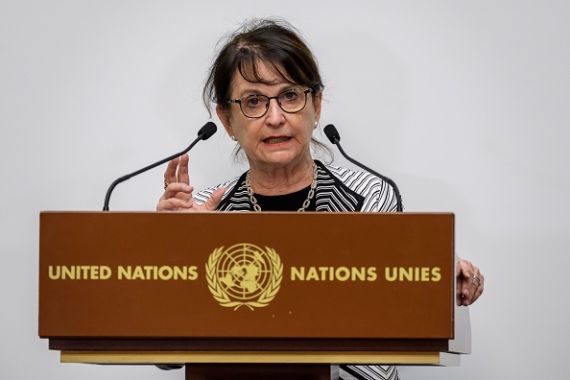Afghanistan ‘on the brink of catastrophe’: UN envoy
UN special representative to Afghanistan urges the international community to find ways to provide financial support to the Afghan people.

The UN envoy for Afghanistan says the country is “on the brink of a humanitarian catastrophe”, urging the international community to find ways to provide financial support to the Afghan people, who “feel abandoned”.
Deborah Lyons said an estimated 60 percent of Afghanistan’s 38 million people are facing crisis levels of hunger in a food emergency that will likely worsen over the winter.
Keep reading
list of 3 itemsAfghanistan: Deadly explosion hits mainly Shia suburb of Kabul
ICC forms group to assess the future of cricket in Afghanistan
“Now is not the time to turn away from the Afghan people,” Lyons said at a press conference on Wednesday at the UN.
“To abandon the Afghan people now would be a historic mistake – a mistake that has been made before with tragic consequences,” she had told the UN Security Council earlier in the day.
Humanitarian catastrophe ‘is preventable’
Lyons added that the humanitarian catastrophe “is preventable” as its main cause is financial sanctions on the Taliban, who took over the country in August, and she assured the international community the UN would make every effort to avoid the diversion of funds to the Taliban.
Sanctions “have paralysed the banking system, affecting every aspect of the economy”, according to the UN envoy. The country’s GDP is estimated to have contracted by 40 percent since the Taliban takeover.
The International Monetary Fund (IMF) blocked the release of about $450m to Afghanistan more than a week after the West-backed government collapsed and the Taliban took over. The Afghan central bank’s $9bn in reserves, most of which are held in the US, were also frozen.
Asked by Al Jazeera’s James Bays if releasing the frozen funds would alleviate the current humanitarian crisis, Lyons said: “We’re looking at the money that has already been committed by the donors for the humanitarian work and making sure we have mechanisms in place to have that flowing.”
“Unfreezing assets is something that is a decision by key countries.”
Lyons said a new mechanism to pay health workers’ salaries has been set up. The Taliban has struggled to pay workers in key sectors such as health and education.
The “paralysis of the banking sector will push more of the financial system into unaccountable and unregulated informal money exchanges,” the envoy said, which “can only help facilitate terrorism, trafficking and further drug smuggling” that will first affect Afghanistan and then “infect the region.”
Against that tenuous backdrop, Lyons warned that the Taliban has been unable to stem the expansion of ISIL (ISIS), which now seems to be present in nearly all provinces and is increasingly active. The UN estimates the number of attacks attributed to ISIL has increased significantly, from 60 last year to 334 this year.
Unfreezing of assets
China and Russia urged the unfreezing of Afghanistan’s reserves, but US Senior Advisor for Special Political Affairs Ambassador Jeffrey DeLaurentis made no mention of sanctions.
He criticised the Taliban for ignoring calls by the Security Council and the international community to peacefully pursue a political settlement to the conflict in Afghanistan and instead choosing a battlefield victory.
“And we are now seeing the terrible consequences of this choice unfold before our eyes,” he told the Security Council.
“But the Afghan people should not have to pay twice for the Taliban decision,” DeLaurentis said, adding that the US is the largest humanitarian donor to Afghanistan, with $474m in aid provided in 2021, and urging other countries to step up their support.
The UN envoy vowed to continue raising difficult issues with the Taliban, including calling for the restoration of rights for women and girls and ethnic minorities and for a more inclusive administration.
Lyons said that the Taliban have recognised the concerns raised by the international community and are trying to address them.
The Taliban government has not been recognised by any country or the United Nations. Afghanistan’s UN seat is still held by the representative of the previous government, Ambassador Ghulam Isaczai.